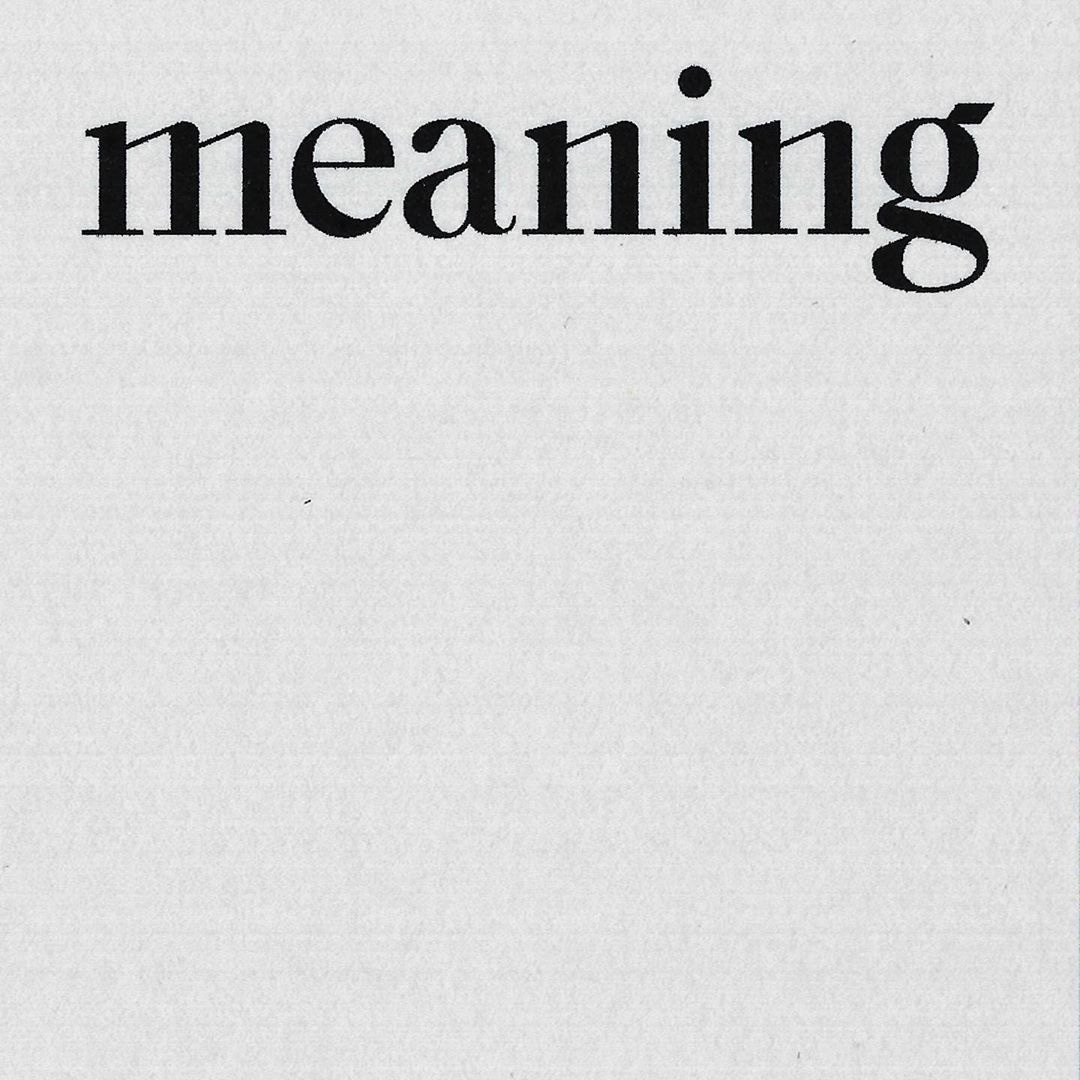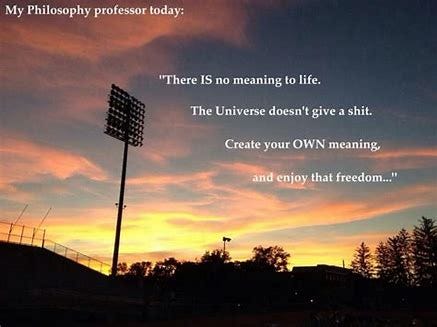Meaning
What is it? Is It Important? Why Do We All Want More Of It?
I can’t tell you how many times someone in therapy has raised this concern:
Dr. Hill, I have no MEANING.
“Meaninglessness in life” is infrequently verbalized so crassly as above.
But still, enumerable variations abound in how an individual perceives meaning or “no meaning.”
Proxy words for (no) or (lack of) meaning:
Loss
Confusion
Demoralization
Trauma
Discontent
Sometimes, but less often, GUILT AND SHAME
Does an angry person have NO meaning?
NO
To be angry at something (or with someone) indicates that this someone (or something) is meaningful. If something is meaningful enough for a person to get angry over, then an angry person has meaning: Unequivocally!
“Angry” MEANING is not usually what a person wants, but it’s MEANING nonetheless.
Some years back, a client was referred to me. Let’s call him Jared.
Public Domain Image
Jared was in his late 40s. Attractive, well-educated, in a tech career. Married with children, he was White, had a majority culture POV, and was wealthy.
His older parents lived nearby; Jared had adult siblings who espoused an LDS (or Mormon) belief. He described himself as agnostic. After seeing several therapists over a few years and consulting with ecclesiastical leaders, friends, family, and even a few psychics (his wife had dabbled in psychic readings), Jared’s wife sought me out.
She heard I had a good reputation for working with older adult men who had existential issues, similar to her husband. She thought Jared might benefit from seeing me. Jared later contacted me and was willing to let me evaluate him for therapy.
Intake information about Jared, including his written story/complaint:
“Dr. Hill, I’m entertaining the idea (only an idea, mind you, so don’t go putting me in the hospital after I tell you this) - this client was savvy of psychologists’ ethical code. After many years of searching and studying, I have concluded that life has no inherent meaning.
If it’s true that there is no meaning in living for me, then my life is not worth living. If this is true, then why should I keep living? And, if I’m set on the idea of not living, then killing myself doesn’t seem out of the question.
“It wouldn’t be hard to do, and I'd do a good job if I took charge of it while I’m healthy and can still do it well.”
“Doc, don’t jump to conclusions!”
I’m not totally suicidal or even that miserable. I live what most people would consider a charmed life. I just can’t see where life is that meaningful. Worse, I feel a lack of genuine personal meaning. Maybe I’m expecting too much. I have a lucrative career with a bank vault full of money, but when I look back, I’m married to an attractive, caring woman who says she loves me more than anything. I realize I’m essential, helpful, and even necessary to her. I’m valued by my kids. However, I don’t derive any personal meaning from any of this. My wife and kids cannot be, nor will they ever be, my major source of meaning. My kids are doing well, but I don’t get much meaning from them. They are, after all, selfish young adults. They couldn’t care less, really, whether I’m around or not, even though they wouldn’t want me killing myself, and that’s OK; I was like them when I was their age.
I’ve traveled, I’m tired of traveling. It’s mostly hard work. There are things to see, but I don’t look around and think, My God! Wow! That huge Acropolis over there is falling into decay! That crumbling bunch of rubble, it’s so meaningful to me.
Sometimes, I’m glad to see it, but then I spend the whole hot Greek day walking through it. I never take pictures - I won’t review them.
Looking at the sky, I realize I’m on a planet. OK, that’s interesting, but I’m not keen enough to search out my origins or the origins of this planet. I like riding my motorcycle, especially on a winding canyon road. Sometimes, I find myself thinking that I could launch myself off the highest precipice here and go sailing into oblivion.
It would be at 50 mph on my Street Bob 114 Harley-Davidson. I would launch from a corner, early in the morning, all by myself, at a reasonable speed, and fly off. The ride would be great and probably very meaningful! The end would be brutal, but that’s OK because, in an instant, I’d be gone, no longer carrying this “no meaning” burden. Sure, a few people would be heartbroken at my death after the fact, but at my Memorial, they would understand.
Doc, don’t worry! I’m not planning this for next year, but it's always on my mind. Let me assure you of this. I’ve been encouraged to see you because you might help me find meaning. You are the last step, Doc, in my search for meaning. I hope you understand the magnitude of the issue.
END OF INTAKE INFORMATION
This was followed by several letters and calls from people close to this person, all desperate and fearful that Jared might follow through and take his own life.
Throughout our sessions, Jared kept reassuring me that he had no intention of “immediately” acting out, and—strange to him anyway—he kept putting this suicide departure date off.
I highlight this case because I don’t think Jared’s concerns are unique. Others, likely similar to him, would feel his pain, but they may express it differently.
As for Jared, I have no idea if he is still alive. I saw him for some years, but then he ended the sessions, disappointed in me and in his experience with me.
Since then, I’ve professionally evolved as a therapist. If I had the chance to repeat it, I might have approached Jared differently, but one never knows.
At the time, a part of me wondered where Jared was coming from.
What was his real purpose for seeing me?
Why was he so intent on my solving his issue of meaning?
It took me a while to decide to take on this case. I knew, going in, this would be a tough challenge and would probably end badly. I read and re-read his bio-sketch with the following thoughts:
“I’ve got a long wait-list of clientele. This client will be challenging; he sounds self-centered and over-privileged, maybe arrogant, insisting that he’s not currently suicidal, so I’ll take him seriously, but then he hedges and says he will kill himself someday. Plus, something about his attitude turns me off. Perhaps he has a hidden agenda that he’s covering up with his ‘no meaning‘ concerns.”
In the end, I decided to take him on as a client. Looking back, he was one of the more demanding clients I have seen for reasons I will describe further as we progress through this entry.
I do not approach the topic of meaning lightly.
I’ve had clients attempt suicide because of a perceived acute and intense lack of meaning. Meaning is a hard-to-define idea. One’s meaning can vary based on many factors, including one’s background, current circumstances, past actions, perceptions, feelings, POV, and belief systems, to name just a few.
Being a source of meaning to someone else is as difficult to grasp as understanding and appreciating what is meaningful to you. Note that Jared, during our sessions, avoided any future affirmation that he meant something to his spouse. Did he “actually” believe what he wrote to me?
What is Meaning?
I start this discussion with definitions.
Definitions help me find common ground with others in points of understanding. The dictionary is almost always a beginning but never an end-point.
What is the lay definition of “Meaning”?
Meaning (noun) - I provide below an “amalgam” definition of the word “Meaning” from several different dictionaries. Why?
Because the word “Meaning” is tricky to clarify by dictionary definition, so multiple perspectives are needed:
…what is intended to be, or is, expressed or indicated; signification; import:
example: “the three meanings of a word.”
…the end, purpose, or significance of something:
example: “What is the meaning of life?
example: “What is the meaning of this intrusion?”
Linguistics
example: “the nonlinguistic cultural correlate, reference, or denotation of a linguistic form; expression.”
example: “linguistic content.”
Definitional point #2 is how most of us define meaning. #1 and #3 are primarily technical definitions for scholars, linguists, and English teachers. #2 would fit Jared’s issue in the case study above.
My POV: Unfortunately, the #2, […the end, purpose, or significance of something…], the dictionary definition confuses “Meaning” with “Purpose.”
Purpose defined: (noun): …1. the reason for which something is done or created or for which something exists:
Meaning emphasizes “significance.” Purpose emphasizes “reason.” At least this is how I see it from a dictionary definition POV. Point #2: The definition of meaning is “purpose.” Meaning and Purpose are, indeed, closely aligned, but:
Are they the same thing?
(e.g., something exists because that something is meaningful…) This is a Tautology.
The lay dictionary does little to help us understand “meaning.”
Let’s try my profession (Psychology).
Consulting the American Psychological Association Dictionary, the word “Meaning” does appear as I anticipated it would.
Why? Because our entire psychological profession is based on the concept of MEANING.
The American Psychological Association Dictionary offers:
MEANING:
n. the cognitive or emotional significance of a word or sequence of words or a concept, sign, or symbolic act. This may include a range of implied or associated ideas (connotative meaning) and literal significance (denotative meaning). The study of meaning in language is known as semantics, and that of meaning in symbolic systems is generally referred to as semiotics.
The APA Dictionary is precise in its definitions but disappointing in terms of depth and usability.
I’d hoped it'd describe the word “meaning” as dimensional, rather than relying solely on the technical terms of “semantics” or “semiotics.”
However, “semiotics” is helpful because it highlights the symbolic features of our everyday lives.
In my POV, meaning resides in Signs and Signifiers for self and others. I plan to write an entire entry on “Semiotics.” It is an essential foundation for thinking, feeling, and acting today (meaning). Appreciating semiotics can be challenging, but if presented clearly, it can illuminate the topic of “meaning.”
I pushed further into the American Psychological Association Dictionary by querying variants of the word “Meaning.”
MEANINGFUL learning
learning new material or information by relating it to the learner’s experience or existing knowledge base, as contrasted with the rote learning of less relevant material. See also readiness.
Then, Meaninglessness. (Negativity is what the APA dictionary emphasizes, e.g., pathology.) Psychologists love negativity.
MEANINGLESSNESS
n. a pervasive sense of the absence of significance, direction, or purpose. A sense of meaninglessness regarding one’s life or life [as a] sometimes… focal issue in psychotherapy. The perception of meaninglessness poses the central problem that the existential approach attempts to solve or accommodate. See also existential psychotherapy; logotherapy; will to meaning.
Why is Meaning so Hard to Pin Down?
Everyone assumes that we all know what the meaning is (and what it stands for) and what it means. WE DON’T.
In the case of Jared, he is hedging his life and future on personal meaning for himself, but his focus is on me as the ultimate provider of his meaning.
Why me?
Because Jared doesn’t know what meaning is (or means) to him, he’s clueless. He wants me to tell him.
The APA Dictionary would have discouraged Jared. It would have likely confirmed to him that meaning (as a feeling state) does not exist. He would not have benefited from this blog entry either. It needs to get to the point, not beat around the bush.
Tell me what meaning is, Dr. Hill, and be done with it!
Why is Meaning Important?
Meaning (Frankl, 1992). Man’s Search for Meaning
Provides purpose for living.
Furnishes values or standards to judge our actions.
Gives us a sense of control over the events in our lives.
What is a Meaningful Life?
A meaningful life is a “purposeful” life. However, a “purposeful” life is not a meaningful life. Think about it, and you will agree. Unfortunately, we return to a dead-end tautology if meaning and purpose are assumed to be the same. The dictionary indicates that Meaning and Purpose are the same. I would argue: THEY ARE NOT!
Why?
For 23 years, I was a professor who gave complex tests. My tests were complex because I made false statements that were hard to identify.
How?
I would embed a partial truth in the falsity of every false statement.
Below are three statements. One of them has FALSE information in it. Which one is FALSE?
True or False
People with meaningful lives have stronger personal relationships, fewer physical health problems, and improved mental health.
Meaning in life reflects the feeling that one's existence has significance, purpose, and coherence.
Meaning is mind-independent. It exists in others, in nature, in communities. People find meaning by seeking it from these and other sources.
Meaning is a self-regulatory and motivational intrapsychic resource that orients people toward the cognitions and behaviors that sustain healthy living.
If you said that #3 was False, you would be correct. Reward yourself with a Congratulations! If you selected #3 as TRUE, that’s OK. This just means you may want to consider how you define and use meaning in your life. Jared was looking for meaning using point #3.
True/False tests don’t teach us much. But what they do accomplish is emphasizing points, say, in a lecture or a reading. The critical point is:
Meaning is Intrapsychic. Meaning is Within us, NOT Outside of us!
What about “God.” My POV: “God” is within us, NOT outside.
Meaning IS MIND - “DEPENDENT.” You believe something is meaningful. If you don’t believe or feel that it is meaningful, then, for all intents and purposes, it has no meaning for you! Think about the Jared case study. Pay close attention to what he is trying to tell me about “his” meaning search.
It’s almost funny that somebody would search for meaning as if one’s meaning is “out there.”
The Truth is “out there,” and meaning is “out there.” Both of these statements are blatantly false. Meaning, like Truth, is subjective; it is within us to determine what is meaningful or truthful. It took me a long time to figure this out, but my life became instantly better when I did. I’m still uncertain, mind you, but better because a piece of the puzzle had been placed for me at least.
Truth is not, however, Meaning.
Something can be FALSE (Santa Claus) but still Meaningful (anticipation of Santa coming down the chimney and throwing presents under the tree (for a plate of cookies and a glass of milk). His reindeer are waiting for him on your rooftop.
There are many reasons for this apparent contradiction, but at this juncture, the focus on what is “out there” (the world of reality) gives way for meaning to what is “inside of us” (our psyche, our authentic self, who we are, not who we pretend we are). We all know who we are. Barring a significant psychiatric disturbance like schizophrenia, You Know Who You Are. (We just don’t tell others who we are. It would be overwhelming to do. Instead, we hide our true selves from others. We use masks, curtains, and tricks to do this. Sometimes, we get so good at this that we might start to believe these masks are who we are. (But, deep down, WE KNOW THEY ARE NOT US!).
It’s almost funny that someone like Jared would ask another person (me) to find and identify one’s source of meaning and then try and convince the person of it.
Psychologists have developed many scales that attempt to measure personal meaning:
What is it?
How is it viewed?
These measures are misnomers. Why? Because they assess limited areas:
Values - What is right or wrong.
Goals - What I want to accomplish in life.
Behaviors - What I like to do with my time.
I’m providing one of these measures. It has published psychometric properties and purports to measure meaning (Values, Goals, Behaviors).
TRY IT FOR YOURSELF:
PERSONAL MEANING PROFILE (PMP)
This questionnaire measures people’s perception of personal meaning in their lives. Generally, a meaningful life involves a sense of purpose and personal significance. However, people often differ in what they value most, and they have different ideas as to what would make life worth living. The following statements describe potential sources of a meaningful life. Please read each statement carefully and indicate to what extent each item characterizes your own life. You may respond by circling the appropriate number according to the following scale:
1 not at all
2
3
4 moderately
5
6
7 a great deal
For example, if going to parties does not contribute to your sense of personal meaning, you may circle 1 or 2. If taking part in volunteer work contributes quite a bit to the meaning in your life, you may circle 5 or 6.
It is important that you answer honestly on the basis of your own experiences and beliefs.
I believe I can make a difference in the world. 1 2 3 4 5 6 7
I have someone to share intimate feelings with. 1 2 3 4 5 6 7
I strive to make this world a better place. 1 2 3 4 5 6 7
I seek to do God’s will. 1 2 3 4 5 6 7
I like challenge. 1 2 3 4 5 6 7
I take initiative. 1 2 3 4 5 6 7
I have a number of good friends. 1 2 3 4 5 6 7
I am trusted by others. 1 2 3 4 5 6 7
I seek to glorify God. 1 2 3 4 5 6 7
Life has treated me fairly. 1 2 3 4 5 6 7
I accept my limitations. 1 2 3 4 5 6 7.
I have a mutually satisfying loving relationship. 1 2 3 4 5 6 7
I am liked by others. 1 2 3 4 5 6 7
I have found someone I love deeply. 1 2 3 4 5 6 7
I accept what cannot be changed. 1 2 3 4 5 6 7
I am persistent and resourceful in attaining my goals. 1 2 3 4 5 6 7
I make a significant contribution to society. 1 2 3 4 5 6 7
I believe that one can have a personal relationship with God. 1 2 3 4 5 6 7
I am treated fairly by others. 1 2 3 4 5 6 7
I have received my fair share of opportunities and rewards. 1 2 3 4 5 6 7
I have learned to live with suffering and make the best of it. 1 2 3 4 5 6 7
Scoring Key 1. Achievement: 5, 6, 16 2. Relationship: 7, 8, 13 3. Religion: 4, 9, 18 4. Self-transcendence: 1, 3, 17 5. Self-acceptance: 11, 15, 21 6. Intimacy: 2, 12, 14 7. Fair treatment: 10, 19, 20
To get a total score, take this test, divide by 21, and get an average. You can contrast your average score to this group from an amalgam of 35 studies of PMP respondents, or about 12,000 people.
McDonald, M. J., Wong, P. T. R., & Gingras, D. T. (2012). Meaning-in-life measures and development of a Brief Version of the Personal Meaning Profile. In P. T. P. Wong (Ed.), The human quest for meaning: Theories, research, and applications (2nd ed., pp. 357–382). Routledge/Taylor & Francis Group.
How did you score on this test?
I wouldn’t get too elated or discouraged by your results. Meaning is defined within this instrument as goals, values, and behaviors, which are then further refined by the subject matter in the scoring key below. The (PMP), in my POV, is biased towards a monotheistic view of religion and a 1st World attitude. There are other biases including the 1 to 7 scoring stem. The PMP only provides information about the traditional psychometric view of the Meaning construct for first-world, Western, Judeo-Christian culture.
If you don’t believe in “God” or a “Mono-Theistic God” (Out There) you will score low on the PMP religion domain. This means adherents of Atheism, Buddhism, Unitarianism, etc., would be categorized as having low religious meaning.
I wouldn’t put too much trust in this test, but I like it is a standard view of what our “culture” thinks is meaningful. Unfortunately, if you are a non-conformist, you will be labeled as having low to no meaning on this test. I score low on this test.
Refer back to the original definition of Meaning.
…the end, purpose, or significance of something…
My space for this blog entry has run out. I plan a follow-up entry on what I will call: A Comprehensive View of What Meaning Is and How We Discover It for Ourselves.








